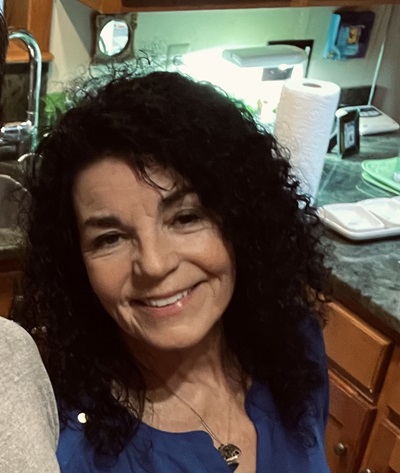 Nancy Delia knows cancer treatment saved her life after she was diagnosed with acute lymphoblastic leukemia (Ph+). But while three years of chemotherapy put her into sustained remission, the treatment also caused side effects that affected Nancy’s quality of life, including fatigue, insomnia and related mood changes.
Nancy Delia knows cancer treatment saved her life after she was diagnosed with acute lymphoblastic leukemia (Ph+). But while three years of chemotherapy put her into sustained remission, the treatment also caused side effects that affected Nancy’s quality of life, including fatigue, insomnia and related mood changes.
Nancy considers herself an energetic, holistically healthy person.
“I’ve always had a zest for life and see the positive side of everything,” she says.
So not feeling like her usual self took a toll. Her oncologist recommended she see Dr. Carl Grey, the director of palliative care at Atrium Health Wake Forest Baptist.
Nancy’s palliative care experience
For three years, Nancy underwent regular chemotherapy infusions. Since completing the infusions, Nancy has been taking a chemotherapy pill each day. While the treatments saved her life, they took a toll on her well-being.
“I struggled to get my Type A personality and energy back to the way it was,” she says. “I couldn’t get up to do yoga. I wouldn’t take a bath because I was too tired after the bath.”
When Nancy met with Grey and his team, “I was in such a safe space,” she says. “They listened and were so awesome. They created a plan for me.”
"With Nancy, we discussed energy conservation, coping skills for her mood, which was affected by those symptoms, and how to remain as active as possible,” says Grey.
The palliative care team also connected Nancy with a health coach to discuss her sleep and nutrition.
“My appointment with the coach was spectacular,” says Nancy. “It was kind of like life coaching.”
Now, Nancy is writing her memoir and feels more like her energized self again.
“I feel alive again,” says Nancy. “I feel like I can focus now. I have energy, which allows me to exercise. I can make plans again because I won’t be too tired to go out. I can be dependable to myself and others.”
She adds, “Cancer treatment was incredibly challenging, but I feel very fortunate that I was able to get through this. I did it with grace and a smile on my face.”
What is palliative care?
“Palliative care is a medical approach that helps improve quality of life for patients with serious, often life-limiting illnesses,” says Dr. Anthony Caprio, a palliative medicine physician at Atrium Health Levine Cancer. “We focus on providing relief from symptoms, pain and stress, regardless of the person’s diagnosis or stage of the disease. Our primary goal is to offer comfort and support to both patients and their families.”
Dr. Caprio says palliative care has many benefits, including:
- Enhanced quality of life: Palliative care takes a holistic approach to well-being by addressing not only physical symptoms, but also emotional, social and spiritual needs.
- Symptom management: Palliative medicine can address symptoms like pain, fatigue, shortness of breath, nausea, diarrhea, depression and anxiety to help patients feel more comfortable.
- Psychosocial and emotional support: Palliative medicine providers can offer support and referrals to counseling services to help patients and caregivers navigate the emotional challenges of a serious illness. They can also connect patients with resources for talking to their children about their illness, navigating career challenges during treatment and addressing spiritual questions.
- Improved communication and clarity: Palliative care providers often facilitate discussions with patients and their families about their treatment preferences and goals to ensure they align with the patient’s desires and values.
- Better care coordination: The palliative care team can assist with organizing medical appointments, treatments and community resources that can support patients.
The palliative care team includes multidisciplinary providers.
“The palliative care team can include physicians, nurses, nurse practitioners, physician assistants, pharmacists, social workers, counselors and chaplains, just to name a few,” says Caprio. “The team works together to help provide palliative care, since palliative care is holistic, whole-person care and a team can more effectively support physical, emotional and spiritual well-being.”
The difference between palliative care and hospice
One of the most common misconceptions about palliative care is that it is only for end-of-life care.
“All hospice care provides palliative care, but not all palliative care is hospice care,” says Caprio.
While palliative care can be used to support people at the end of their lives and those who are no longer pursuing curative treatment, it can also complement curative therapies.
“Patients with cancer do better with their cancer treatment and their cancer if they are more functional and they are resting,” says Grey. “I believe most of the ways we help in the world of cancer is optimizing their function and rest with symptom control. If their symptoms improve, they can live better and longer with their cancer.”
Both Grey and Caprio encourage patients to talk to their oncologist about palliative care options. Learn more about our palliative care services at Levine Cancer Institute and Atrium Health Wake Forest Baptist.
